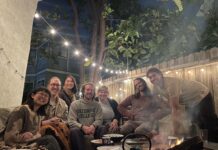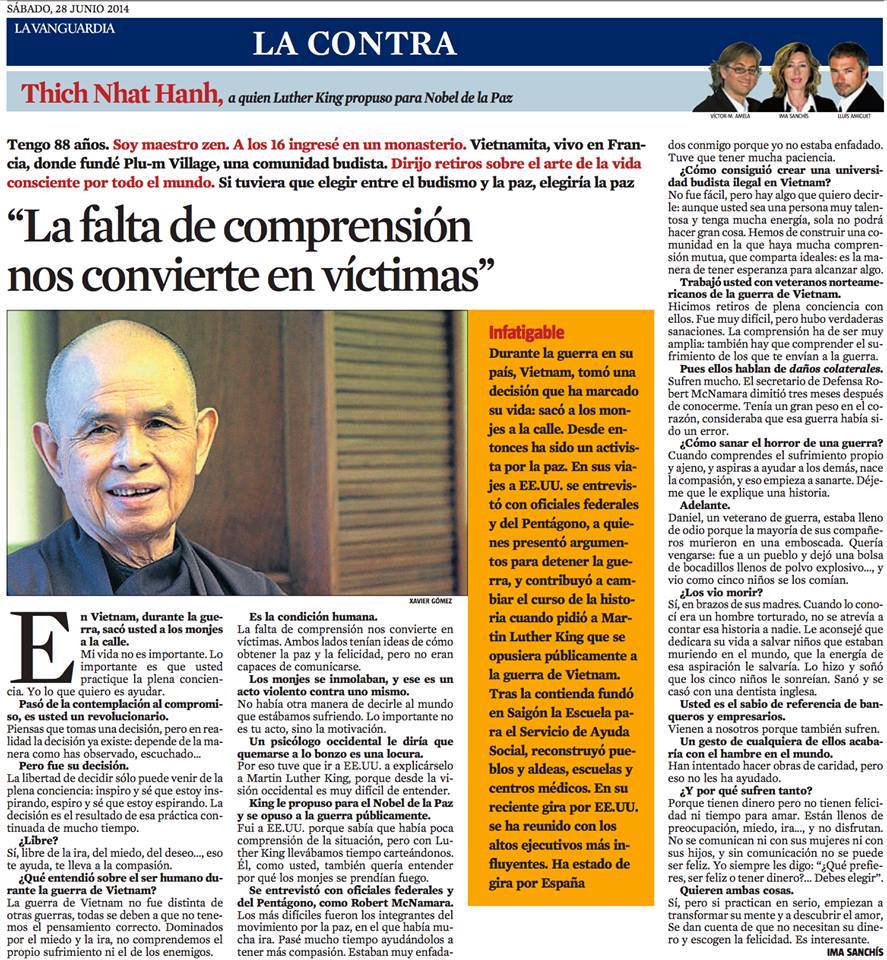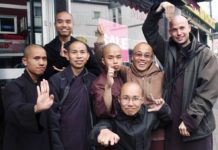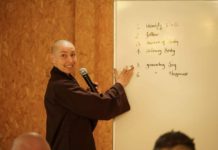This article was featured in the Spanish newspaper Lavanguardia on 28 June 2014.
Thich Nhat Hanh, whom Martin Luther King nominated for the Nobel Peace Prize
I am 88 years old. I am Zen master. On my 16th I entered a monastery. Vietnamese, I live in France, where I founded Plum Village, a Buddhist community. I lead retreats about the art of living mindfully for everyone. If I had to choose between Buddhism and peace, I would choose peace.
In Vietnam, during the war, you took the monks in the streets.
My life is not important. What is important is that you practice mindfulness. What I want is to help.
You moved from contemplation to commitment, you are a revolutionary.
You think you take a decision, but in reality the decision already exists: it all depends on the way you have observed, listened…
But it was your decision.
The freedom to decide can only come from mindfulness: I breathe in and I know I’m breathing in; I breathe out and I know I’m breathing out. The decision is the result of this practice continued for a long time.
Freedom?
Yes, freedom from anger, fear, desire…., this will help you and bring you compassion.
What have you learned about the human being during the Vietnam War?
The Vietnam War wasn’t distinct from other wars. They all come from us not having right thinking. Dominated by fear and anger, we do not understand our own suffering nor that of our enemies.
It’s the human condition.
The lack of comprehension turns us into victims. Both sides have ideas about how to obtain peace and happiness, but they are not able to communicate with each other.
The monks sacrificed themselves, which is an act of violence against oneself.
There was no other way to tell the world that we were suffering. The important thing is not your acts, but the motivation.
A Western psychologist would have said that setting yourself on fire as a sacrifice is crazy.
That’s why I had to go to the United States to explain this to Martin Luther King because from the Western point of view, it was very difficult to understand.
King nominated you for the Nobel Peace Prize and publicly opposed the War.
I went to the United States because I knew there was little comprehension of the situation, but with Luther King we spent a long time exchanging postcards. He, like you, also wanted to understand why the monks set themselves on fire.
You were interviewed by federal officials and those from the Pentagon, like Robert McNamara.
The most difficult ones were the participants from the peace movement, who had a lot of anger. I spent a lot of time helping them to have more compassion. They were very angry with me because I was not angry. I had to have a lot of patience.
How did you accomplish to create an illegal Buddhist University in Vietnam?
It wasn’t easy, but there is something I wish to tell you. Even if you are a very talented person and you have a lot of energy, you cannot achieve big things alone. We created a community where there is a lot of mutual understanding, and which shares ideals: it is the way to have hope to achieve something.
You worked with North American veterans of the Vietnam War.
We’ve had mindfulness retreats with them. It was very difficult, but there was true healing. The understanding must become very deep: You also have to understand the suffering of those who sent you to war.
But they talk about collateral damage.
They suffer a lot. The Secretary of Defense Robert McNamara resigned three months after meeting me. He carried a heavy weight in his heart; he considered that this war had been a mistake.
How to heal the horror of a war?
When you understand your own suffering and that of the other, and you aspire to help others, compassion is born. This will start to heal you. Allow me to tell you a story.
Go ahead.
-Daniel, a war veteran, was full of hate because the majority of his companions died in an ambush. He wanted revenge. He went to a village and left a bag of sandwiches filled with gunpowder…, and he watched as five children ate them.
He saw them die?
Yes, in the arms of their mothers. When I met him he was a tortured man; he did not dare to tell this story to anyone. I recommended him to dedicate his life to save children who were dying in the world, that the energy of this aspiration would save him. He did it and dreamed that the five children smiled at him. He was healed and married an English dentist.
You are the sage as a reference for bankers and business people.
They come to us because they also suffer.
A gesture of whomever amongst them could end hunger in the world.
They have tried to do charity projects, but this hasn’t helped them.
And why do they suffer so much?
Because they have money but they do not have happiness nor time to love. They are full of worries, fear, anger…, and they do not enjoy themselves. They do not communicate with each other, nor with their wives and children, and without communication they cannot be happy. I always tell them: “What do you prefer, being happy or having money?… You have to choose.”
They want both things.
Yes, but when they practice seriously, they start to transform their mind and discover love. They realise that they do not need money and choose happiness. It’s interesting.
Tireless
During the war in his country, Vietnam, he made a decision that marked his life: he took the monks into the streets. Ever since then he’s been a peace activist. In his travels to the United States, he was interviewed by federal officials and those from the Pentagon, who presented arguments to stop the war, and contributed to change the course of history when he asked Martin Luther King to publicly oppose the Vietnam War. After the battle, he founded the School of Youth and Social Services, rebuilt villages and small towns, schools and medical centres. In his recent US tour, he got together with the most influential top executives. He just toured Spain.
Ima Sanchís



















